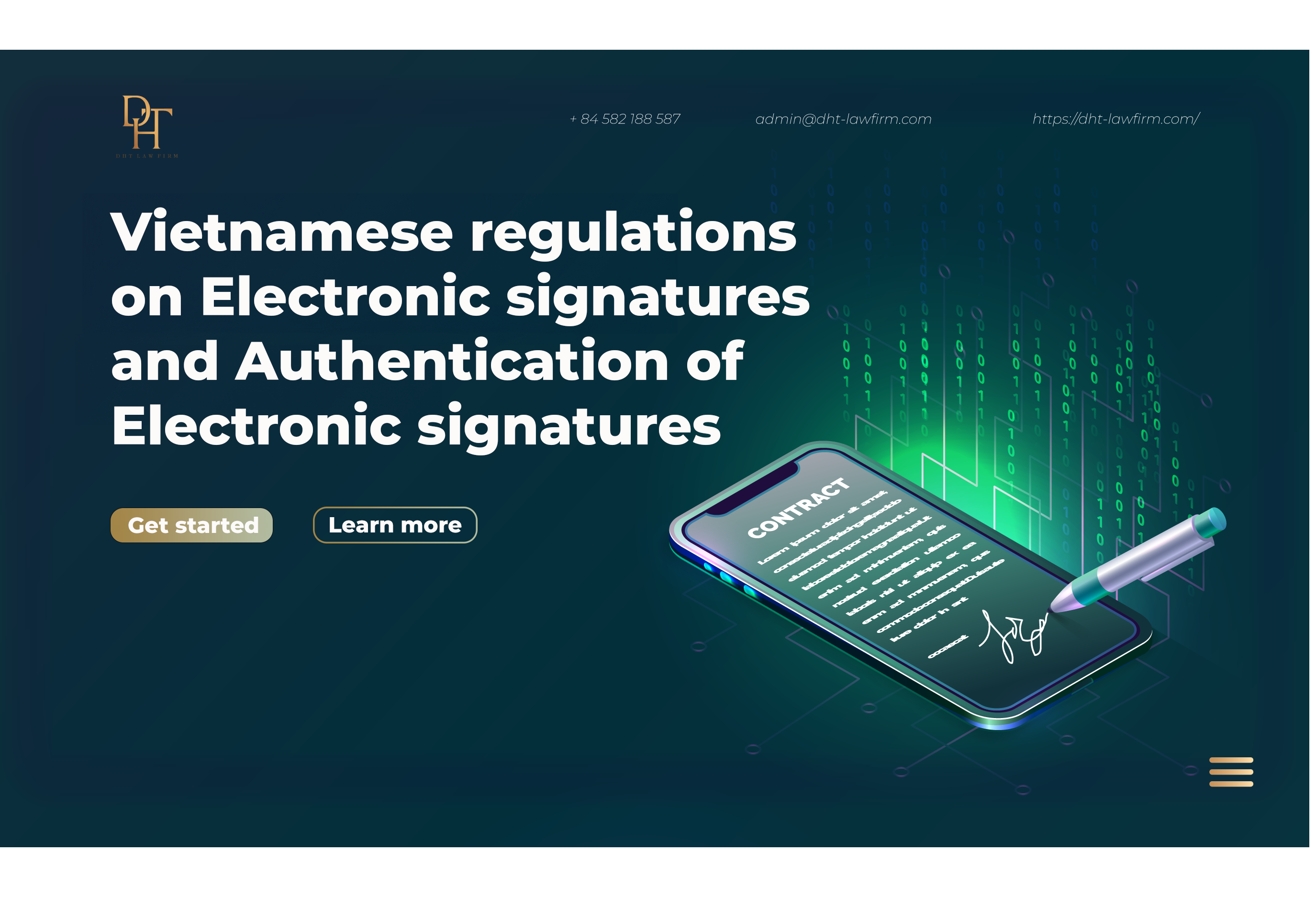
VIETNAMESE REGULATIONS ON ELECTRONIC SIGNATURES AND AUTHENTICATION OF ELECTRONIC SIGNATURES
Electronic signatures play a vital role in today's increasingly digital and online business environment. They ensure the authenticity, integrity, and legal compliance of documents and information exchanged. In light of this, Vietnam's Law on Electronic Transactions has regulated and provided provisions regarding electronic signatures, creating favorable conditions for their use and recognition in business and legal activities. The following is an article by Dai Ha Thanh Law Firm that shares some regulations on electronic signatures, their characteristics, and the legal requirements associated with their use in Vietnam.
1. Overview of electronic signatures
1.1. Definition on electronic signatures
According to Clause 1, Article 21 of the Law on Electronic Transactions 2005, an electronic signature is defined as a signature "created in the form of words, letters, numbers, symbols, sounds or other forms using electronic means, attached or logically associated with a data message, capable of identifying the person signing the data message and confirming that person's approval of the content of the signed data message".
Types of electronic signatures commonly used include:
+ Digital signature means an advanced version of an electronic signature, created by transforming data messages using an asymmetric cryptographic system. Only the signer, using the private key, can create a valid digital signature. Therefore, digital signatures are considered the most secure and are the most used at present.
+ Scanned signature means a signature signed directly by the signer on a document or contract, then converted into electronic form by scanning the signature and sending it via email.
+ Image signature means a signature signed by hand, then converted into an image and inserted into an electronic document or contract.
1.2. Features of electronic signatures
- Diversity of expression:
Electronic signatures can be expressed in many different forms. It can be created using codes, images or other advanced technical methods. This diversity allows electronic signatures to be flexible and suitable for a variety of purposes and platforms.
- Additional technical requirements:
To create and use electronic signatures, several technical requirements are required to ensure security and authenticity. Encryption technology and authentication systems are used to ensure that electronic signatures cannot be tampered with and can only be created by an authorized person.
- Verification and authentication capabilities
Electronic signatures have the ability to verify the integrity and origin of a document or information they sign. When a document or information is signed with an electronic signature, it carries a unique electronic fingerprint that cannot be altered. Information about the signer and the time of signing is also linked to the signature, enabling clear identification of the signer and the time of signing. This is particularly useful in online transactions where identifying the participants and ensuring the integrity of the documents is crucial.
- Validity
Electronic signatures have been recognized as having the same legal value as paper signatures in many countries, including the United States, the European Union (EU), Canada, Australia, Japan, etc... This means that electronic signatures can be accepted and recognized in legal transactions, contracts and other authentication processes. This recognition increases efficiency and convenience in conducting online and digital transactions.
2. Legal requirements for electronic signatures
2.1. Circumstances in which using an electronic signature is required
2.1.1. In case of using electronic invoices
From July 1, 2022, enterprises are required to convert to electronic invoices for the purchase and sale of goods and services, with some exceptions such as small and medium-sized enterprises, cooperatives, households, and individuals conducting business in economically and socially difficult areas, especially those unable to conduct transactions with tax authorities electronically. This requirement is stipulated in Article 91 of the Law on Tax Administration 2019, Decree No. 123/2020/ND-CP, and Circular No. 78/2021/TT-BTC.
According to Clause 7, Article 10 of Decree No. 123/2020/ND-CP:
“"For electronic invoices:
In the case of the seller being an enterprise or organization, the digital signature on the invoice is the digital signature of the enterprise or organization. In the case of the seller being an individual, they can use their own digital signature or the digital signature of an authorized person.
Electronic invoices may or may not require the digital signatures of both the seller and the buyer, as specified in Clause 14 of this Article."
Therefore, according to the above regulations, electronic invoices with tax identification numbers issued by the tax authorities must have the digital signature of the seller. The presence of the seller's stamp and the buyer's digital signature may or may not be required.
2.1.2. In case of declaring and paying taxes
Since 2015, enterprises in Vietnam are required to conduct transactions with tax authorities using electronic transactions. This has been clearly shown in Official Dispatch No. 16132/BTC-TCT on Promoting the implementation of the Electronic Tax Payment program.
At the same time, Clause 12, Article 5, Decree No. 12/2015/ND-CP also stipulates: "Taxpayers are business organizations that use electronic services provided by tax authorities (tax registration, declare, pay taxes, look up and send tax information), except for special cases according to regulations of the Ministry of Finance.
Regarding tax declaration and payment by enterprises, Clause 10, Article 17 of the Law on Tax Administration 2019 No. 38/2019/QH14 stipulates: "Taxpayers conducting business activities in areas with public infrastructure Information technology must declare, pay taxes, and transact with tax authorities through electronic means in accordance with the law.
Along with the transition from paying taxes directly in cash to paying taxes electronically, enterprises are also required to use digital signatures instead of handwritten signatures when conducting transactions with regulatory agencies. current tax.
2.1.3. In case of declaring social insurance
In Article 4, Decision 838/QD-BHXH stipulates:
"1. Organizations and individuals conducting electronic transactions in the field of social insurance must have a valid digital certificate issued by an organization providing digital signature authentication services according to the provisions of law. In case an individual conducts electronic transactions in the field of social insurance but has not yet been issued a digital certificate, he or she may use the electronic transaction authentication code issued by Vietnam Social Insurance.
2. The use of digital signatures and electronic transaction authentication codes specified in this document is collectively referred to as electronic signing.”
From the above regulations, it can be seen that individuals, organizations/enterprises are now required to use digital signatures when declaring social insurance online.
2.2. When does an electronic signature have legal value?
According to the Law on Electronic Transactions 2005, an electronic signature is legally valid if:
- The method of creating the electronic signature allows for the verification of the signer and the demonstration of the signer's acceptance of the content of the contract.
- The method of creating the electronic signature is sufficiently reliable, in accordance with the purpose for which the contract was initiated and sent
In cases where the law requires a document to be stamped by an agency or organization, the electronic signature of that agency or organization carries legal validity when it satisfies the security requirements set forth for electronic signatures and authentication.
Conditions to ensure safety for electronic signatures include:
- The data that creates an electronic signature is uniquely tied to the signer in the context in which that data is used;
- The data that creates the electronic signature is only under the control of the signer at the time of signing;
- Any changes to the electronic signature after the time of signing can be detected;
- Any changes to the content of the data message after the time of signing can be detected.
- Electronic signatures of government agencies must be authenticated by organizations/agencies providing electronic signature authentication services as prescribed by competent government agencies.
Thus, cases where electronic signatures need authentication include:
- The electronic signature of the agency or organization is required to be stamped according to the provisions of law.
- Electronic signatures of government agencies, to have legal value, must be authenticated by an organization providing electronic signature authentication services prescribed by a competent government agency.
These cases all require electronic signature authentication from an authorized and trustworthy organization. The authentication process typically includes verifying the signer's identity, checking data integrity, and determining the reliability of the electronic signature creation method.
3. Authentication of electronic signature
3.1. What is electronic signature authentication?
According to the Law on Electronic Transactions 2005, "electronic signature authentication" is the confirmation that the agency, organization or individual being authenticated is the person signing the electronic signature.
Authentication will be demonstrated by the authentication agency issuing an digital certificate certifying that the agency, organization or individual being authenticated is the person signing the electronic signature. This is to ensure the responsibility of the person signing the electronic signature when a dispute arises.
The digital certificate is valid when it has not expired, has not been suspended or revoked.
3.2. Contents that must be included in the digital authentication:
According to Article 5 of Decree 130/2018/NĐ-CP, the contents of a digital certificate must include the following:
3.3. Where to register a digital certificate?
The following are the authorized organizations/entities for issuing digital certificates:
- National Certification Authority: This is a public enterprise under the Ministry of Information and Communications. It provides digital signature authentication services to public certification service providers, specialized digital signature authentication service providers of agencies and organizations meeting the required security conditions for specialized digital signatures, and foreign organizations, agencies, and individuals using digital certificates in Vietnam.
The National Certification Authority is the only organization that provides national digital signature authentication services.
- Public Digital Signature Authentication Service Provider: This organization provides digital signature authentication services to government agencies, organizations, and individuals for public activities.
- Specialized Digital Signature Authentication Service Provider: This organization specializes in providing digital signature authentication services to specific fields or industries. These entities have similar operating characteristics or purposes and are interconnected through regulations or legal documents on organization or association forms and joint activities. These organizations do not operate for commercial purposes.
The specialized digital signature authentication service providers include:
- Government specialized digital signature authentication service provider: It serves Party and State agencies by providing digital signature authentication services.
- Institutional specialized digital signature authentication service provider: This entity offers digital signature authentication services to agencies and organizations. These providers must register their activities with the state management agency for digital signature authentication services in accordance with the law.
Above is a general overview of the legal issues related to electronic signatures and electronic signature authentication in Vietnam. At Dai Ha Thanh Law Firm, our team of lawyers and legal advisors, professionally trained both domestically and internationally, are committed to providing professional legal services to our esteemed clients. If you require detailed consultation, please feel free to contact us for professional and effective legal advisory services.
